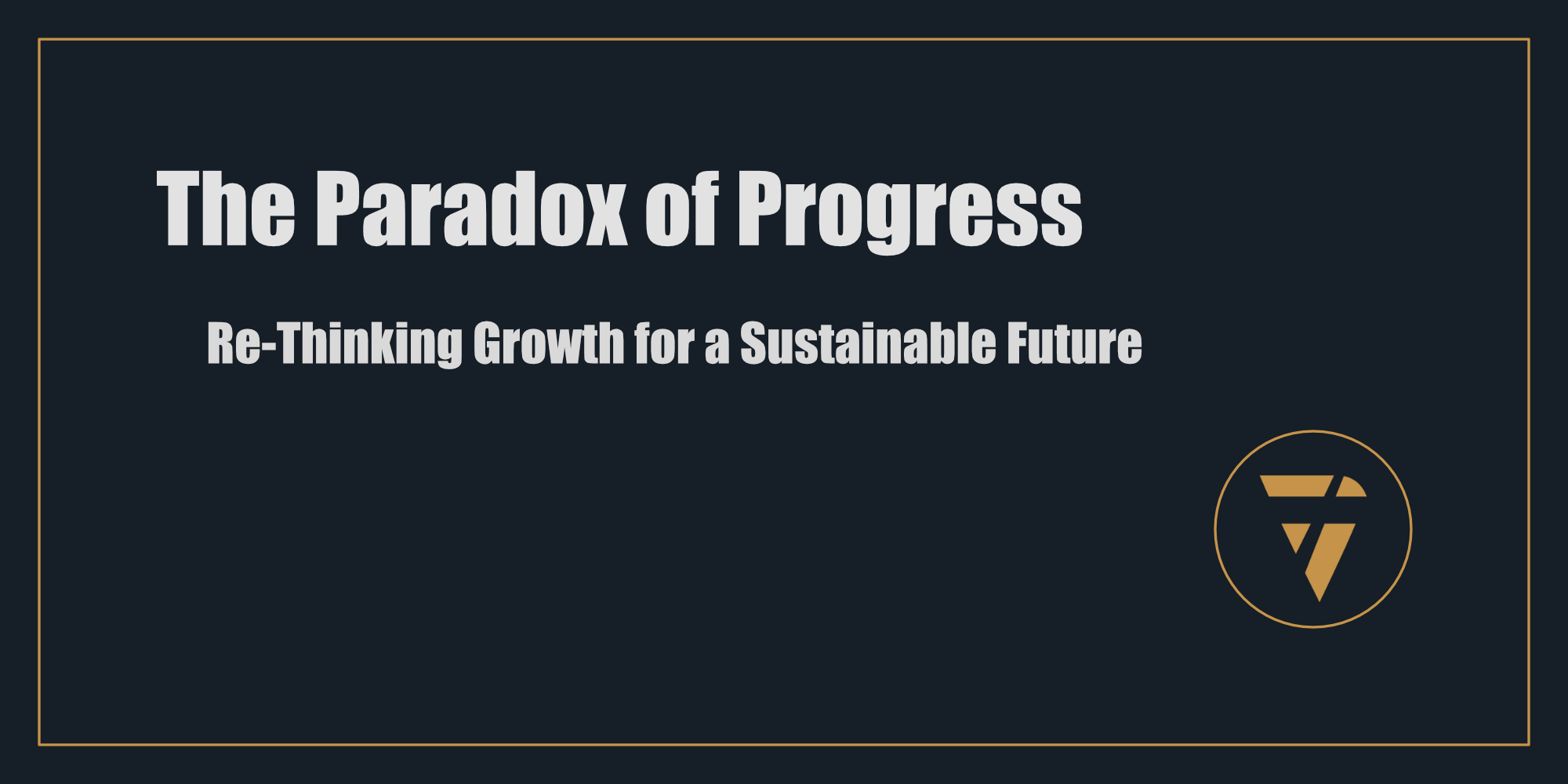The Paradox of Progress
Re-Thinking Growth for a Sustainable Future

What if the very systems that drive our prosperity are also paving the way for our undoing?
Progress is the hallmark of modern civilization. It’s the skyscrapers reshaping skylines, the technologies connecting continents, and the markets spinning at dizzying speeds. Growth is the story we tell ourselves, of innovation, opportunity, and unending possibility. But beneath this narrative lies a troubling paradox: the same engines fueling our progress are threatening our planet, widening inequalities, and destabilizing the foundations of long-term prosperity.
It’s time to ask: What does true progress look like? And more importantly, how do we achieve it without compromising the future?
The Growth Dilemma
At the heart of our economic systems lies a singular metric: Gross Domestic Product (GDP). Invented in the 1930s, GDP was never intended to measure societal well-being or ecological health. Yet today, it serves as the dominant yardstick for success. If GDP grows, nations celebrate. But this metric is flawed, blind to environmental costs, social inequities, and the long-term consequences of short-term gains.
Here’s the dilemma: GDP rises when forests are cut down, but doesn’t count the value of the ecosystems lost. It increases when we replace products intentionally designed to fail but ignores the waste choking our landfills. It thrives on consumption but overlooks the sustainability of what’s consumed.
Growth, as we measure it today, rewards excess and extraction while failing to account for resilience, equity, and sustainability.
It does not account for accountability.
The Hidden Costs of Progress
Take the example of planned obsolescence—the deliberate design of products with short lifespans. In the consumer tech industry, this practice is rampant. Smartphones, laptops, and appliances are built to break, ensuring customers return to buy replacements. On the surface, this drives economic growth. Beneath the surface, it fuels a cycle of waste, resource depletion, and rising consumer debt.
This is progress gone awry. And planned obsolescence is just one of many systemic issues. Consider the environmental toll of rapid industrialization or the widening wealth gaps exacerbated by uneven growth. These are the hidden costs of our relentless pursuit of more.
Re-Thinking Progress: A New Framework
What if we could redefine growth to account for what truly matters? Imagine an economic system that values:
Longevity Over Waste:
Products designed to last, repairable and upgradable by default.
A shift from linear consumption to circular economies where waste is eliminated.
Well-Being Over Wealth:
Metrics like the Social Progress Index or Doughnut Economics, which measure societal health, equity, and environmental balance alongside economic activity.
Sustainability Over Speed:
Growth powered by renewable energy, regenerative agriculture, and sustainable industries.
Businesses prioritizing long-term value creation over quarterly profits.
Lessons from Innovators
Across the globe, innovators are already building this future:
- Amsterdam is pioneering a circular economy, where materials are reused endlessly, minimizing waste.
- Bhutan measures success through Gross National Happiness, prioritizing well-being over GDP.
- Companies like Patagonia design products for durability, offering repairs rather than replacements, and re-invest profits into environmental preservation.
These examples prove that sustainable progress isn’t a fantasy, it’s happening now. The challenge is scaling these models to reshape entire economies.
Your Role in the Shift
This isn’t just a task for governments and corporations. Individuals play a pivotal role in transforming the systems around us. Start small:
- As a consumer: Choose products from companies committed to sustainability. Repair instead of replace whenever possible.
- As an advocate: Support policies that prioritize renewable energy, fair labour practices, and environmental protection.
- As a creator: Build businesses, ideas, or movements that challenge the status quo, and drive sustainable innovation.
Progress begins with a choice—yours.
What Comes Next
Over the coming weeks, we will explore the pathways to redefining progress. We’ll dive into the economics of sustainability, the business models of the future, and the actions individuals can take to contribute to meaningful change. Together, we’ll uncover how to align growth with the needs of our planet and its people.
The future isn’t written yet, it’s being shaped today. Will you be part of the solution?
Engage With Us
- What does progress mean to you? Share your thoughts.
- If this resonated with you, subscribe for more insights on growth, sustainability, and innovation.
- Ready to transform your business or community? Connect for a deeper conversation.
Let’s redefine what it means to thrive, together.
This Substack is reader-supported. To receive new posts and support my work, consider becoming a free or paid subscriber.
This is what I’m working on. Tell me what you think, I enjoy the conversation! Subscribe and follow the work in real time.
Thanks!
B
People don’t want things—they want meaning. Build products, services, and businesses that outlast trends. Longevity is the new luxury.
Defective Algebra was my favourite moment today, thanks Umbrarchist :)
PS -





